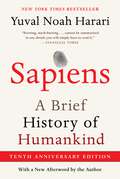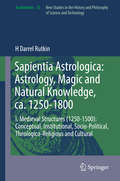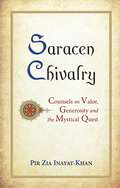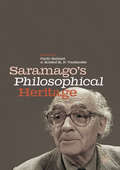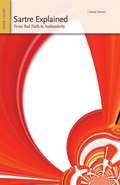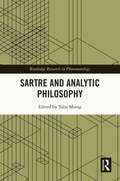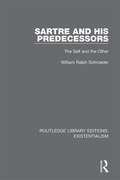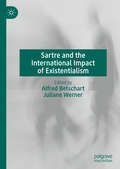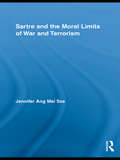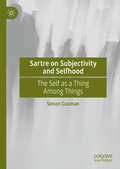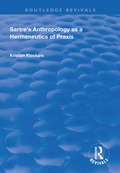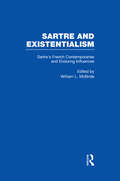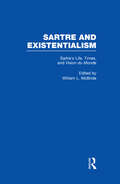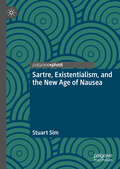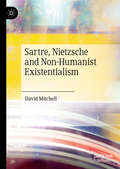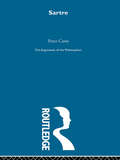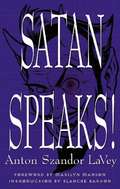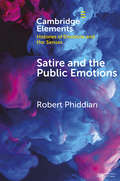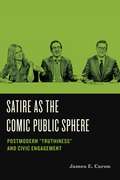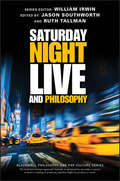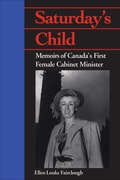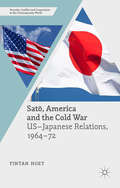- Table View
- List View
Sapiens [Tenth Anniversary Edition]: A Brief History of Humankind
by Yuval Noah HarariNew York Times Readers’ Pick: Top 100 Books of the 21st CenturyThe tenth anniversary edition of the internationally bestselling phenomenon that cemented Yuval Noah Harari as one of the most prominent historians of our time—featuring a new afterword from the author.One hundred thousand years ago, at least six human species inhabited the earth. Today there is just one. Us. Homo sapiens. How did our species succeed in the battle for dominance? Why did our foraging ancestors come together to create cities and kingdoms? How did we come to believe in gods, nations, and human rights; to trust money, books, and laws; and to be enslaved by bureaucracy, timetables, and consumerism? And what will our world be like in the millennia to come?In Sapiens, Professor Yuval Noah Harari spans the whole of human history, from the very first humans to walk the earth to the radical—and sometimes devastating—breakthroughs of the Cognitive, Agricultural, and Scientific Revolutions. Drawing on insights from biology, anthropology, paleontology, and economics, and incorporating full-color illustrations throughout the text, he explores how the currents of history have shaped our human societies, the animals and plants around us, and even our personalities. Can we ever free our behavior from the legacy of our ancestors? And what, if anything, can we do to influence the course of the centuries to come?Bold, wide-ranging, and provocative, Sapiens integrates history and science to challenge everything we thought we knew about being human: our thoughts, our actions, our heritage...and our future.
Sapientia Astrologica: I. Medieval Structures (1250-1500): Conceptual, Institutional, Socio-Political, Theologico-Religious and Cultural (Archimedes #55)
by H Darrel RutkinThis book explores the changing perspective of astrology from the Middle Ages to the Early Modern Era. It introduces a framework for understanding both its former centrality and its later removal from legitimate knowledge and practice. The discussion reconstructs the changing roles of astrology in Western science, theology, and culture from 1250 to 1500. The author considers both the how and the why. He analyzes and integrates a broad range of sources. This analysis shows that the history of astrology—in particular, the story of the protracted criticism and ultimate removal of astrology from the realm of legitimate knowledge and practice—is crucial for fully understanding the transition from premodern Aristotelian-Ptolemaic natural philosophy to modern Newtonian science. This removal, the author argues, was neither obvious nor unproblematic. Astrology was not some sort of magical nebulous hodge-podge of beliefs. Rather, astrology emerged in the 13th century as a richly mathematical system that served to integrate astronomy and natural philosophy, precisely the aim of the “New Science” of the 17th century. As such, it becomes a fundamentally important historical question to determine why this promising astrological synthesis was rejected in favor of a rather different mathematical natural philosophy—and one with a very different causal structure than Aristotle's.
Saracen Chivalry
by Pir Zia KhanSaracen Chivalry explores the space between Arthurian romance and the ethics and spirituality of Sufism. Framed as a medieval treatise penned by a fabled African queen, the book articulates a vision of life centered on the virtues of wisdom, courage, temperance, and generosity, illustrating these virtues with scriptural verses, prophetic sayings, sage maxims, and traditional legends and lore.Queen Belacane is dying. As a last act, she inscribes a book of counsels, or prince&’s mirror, to guide her newborn son on his life&’s path. The Queen&’s counsels illuminate the way of futuwwa, a tradition of mystical chivalry traced to the Prophet Abraham. If the Prince would unite the chivalries of Christendom and Islam and attain the Cup Mixed with Camphor, he must fulfill the pillars of his faith, and uphold the universal virtues of wisdom, courage, temperance, and generosity.
Saramago’s Philosophical Heritage
by Carlo Salzani Kristof K. VanhoutteThe past decades have seen a growing “philosophical” interest in a number of authors, but strangely enough Saramago’s oeuvre has been left somewhat aside. This volume aims at filling this gap by providing a diverse range of philosophical perspectives and expositions on Saramago’s work. The chapters explore some possible issues arising from his works: from his use of Plato’s allegory of the cave to his re-readings of Biblical stories; from his critique and “reinvention” of philosophy of history to his allegorical exploration of alternative histories; from his humorous approach to our being-towards-death to the revolutionary political charge of his fiction. The essays here confront Saramago’s fiction with concepts, theories, and suggestions belonging to various philosophical traditions and philosophers including Plato, Pascal, Kierkegaard, Freud, Benjamin, Heidegger, Lacan, Foucault, Patočka, Derrida, Agamben, and Žižek.
Sartre
by Thomas R. FlynnSartre and Foucault were two of the most prominent and at times mutually antagonistic philosophical figures of the twentieth century. And nowhere are the antithetical natures of their existentialist and poststructuralist philosophies more apparent than in their disparate approaches to historical understanding. A history, thought Foucault, should be a kind of map, a comparative charting of structural transformations and displacements. But for Sartre, authentic historical understanding demanded a much more personal and committed narrative, a kind of interpretive diary of moral choices and risks compelled by critical necessity and an exacting reality. Sartre's history, a rational history of individual lives and their intrinsic social worlds, was in essence immersed in biography. In Volume One of this authoritative two-volume work, Thomas R. Flynn conducts a pivotal and comprehensive reconstruction of Sartrean historical theory, and provocatively anticipates the Foucauldian counterpoint to come in Volume Two.
Sartre Explained
by David DetmerThe French philosopher Jean-Paul Sartre (1905-1980) was the major representative of the philosophical movement called "existentialism," and he remains by far the most famous philosopher, worldwide, of the post-World War Two era.This book will provide readers with all the help they will need to find their own way in Sartre's works. Author David Detmer provides a clear, accurate, and accessible guide to Sartre's work, introducing readers to all of his major theories, explaining the ways in which the different strands of his thought are interrelated, and offering an overview of several of his most important works.Sartre was an extraordinarily versatile and prolific writer. His gigantic corpus includes novels, plays, screenplays, short stories, essays on art, literature, and politics, an autobiography, several biographies of other writers, and two long, dense, complicated, systematic works of philosophy (Being and Nothingness and Critique of Dialectical Reason). His treatment of philosophical issues is spread out over a body of writing that many find highly intimidating because of its size, diversity, and complexity.A distinctive feature of this book is that it is comprehensive. The vast majority of books on Sartre, including those that are billed as introductions to his work, are highly selective in their coverage. For example, many of them deal only with his early writings and neglect the massive and difficult Critique of Dialectical Reason, or they address only his philosophical work and ignore his novels and plays (or vice versa). The present book, by contrast, discusses works in all of Sartre's literary genres and from all phases of his career.An introductory chapter provides an overview of Sartre's life and work. The next chapter analyzes several of Sartre's earliest philosophical writings. Each of the next six chapters is devoted to an in-depth examination of a single key book. Two of these chapters are devoted to philosophical works, two to plays, one to a biography, and one to a novel. These chapters also contain some discussion of other writings insofar as these are relevant to the topics under consideration there. A final chapter considers important concepts and theories that are not found in the major works discussed in earlier chapters, briefly introduces other important works of Sartre's, and offers some final thoughts. The book concludes with a short annotated bibliography with suggestions for further reading.Central to all of Sartre's writing was his attempt to describe the salient features of human existence: freedom, responsibility, the emotions, relations with others, work, embodiment, perception, imagination, death, and so forth. In this way he attempted to bring clarity and rigor to the murky realm of the subjective, limiting his focus neither to the purely intellectual side of life (the world of reasoning, or, more broadly, of thinking), nor to those objective features of human life that permit of study from the "outside." Instead, he broadened his focus so as to include the meaning of all facets of human existence. Thus, his work addressed, in a fundamental way, and primarily from the "inside" (where Sartre's skills as a novelist and dramatist served him well) the question of how an individual is related to everything that comprises his or her situation: the physical world, other individuals, complex social collectives, and the cultural world of artifacts and institutions.
Sartre and Analytic Philosophy (Routledge Research in Phenomenology)
by Talia MoragThis book explores the relevance of Sartre’s work for various areas in contemporary philosophy, including the imagination, philosophy of language, skepticism, social ontology, logic, film, practical rationality, emotions, and psychoanalysis. Unlike other collections focused on Sartre, this book is not intended as a book of Sartre scholarship or interpretation. The volume’s contributors, trained in analytic philosophy, engage with Sartre’s work in new refreshing ways, which does not require seeing him as primarily belonging to the continental philosophical traditions of phenomenology or existentialism. Instead, this book aims to make available and fruitfully explore the unheralded insights of Sartre, to creatively re-appropriate or rationally reconstruct certain fruitful ideas or approaches of Sartre and confront them with or make them available to contemporary philosophy in general. Sartre thereby emerges from this book as a versatile philosopher with a stake in a large variety of philosophical concerns. Sartre and Analytic Philosophy will appeal to Sartre scholars who are interested in his relevance to contemporary philosophical debates, as well as philosophers who are interested in exploring new ways of doing philosophy, which are neither stereotypically “analytic” nor “continental.”
Sartre and his Predecessors: The Self and the Other (Routledge Library Editions: Existentialism #8)
by William Ralph SchroederThis study, first published in 1984, presents an explanation and critical examination of the theories of Sartre, Heidegger, Husserl and Hegel on the fundamental relationships between persons. It also synthesizes the results into a new conception of one’s relation to other people. Sartre’s famous discussion of ‘the Look’ in his early treatise, Being and Nothingness, is the point of departure and central text. Since Sartre critically responds to his three famous predecessors, these thinkers are given an independent hearing. The book demonstrates various ways in which persons are internally related to one another, shows that one’s access to other people typically does not compare unfavourably with one’s access to oneself, and establishes the importance of a prior comprehension of the status of other people for an adequate treatment of knowing them.
Sartre and the International Impact of Existentialism
by Alfred Betschart Juliane WernerThis edited collection re-examines the global impact of Sartre’s philosophy from 1944-68. From his emergence as an eminent philosopher, dramatist, and novelist, to becoming the ‘world’s conscience’ through his political commitment, Jean-Paul Sartre shaped the mind-set of a generation, influencing writers and thinkers both in France and far beyond.Exploring the presence of existentialism in literature, theatre, philosophy, politics, psychology and film, the contributors seek to discover what made Sartre’s philosophy so successful outside of France. With twenty diverse chapters encompassing the US, Europe, the Middle East, East Asia and Latin America, the volume analyses the dissemination of existentialism through literary periodicals, plays, universities and libraries around the world, as well as the substantial challenges it faced.The global post-war surge of existentialism left permanent traces in history, exerting considerable influence on our way of life in its quest for authenticity and freedom. This timely and compelling volume revives the path taken by a philosophical movement that continues to contribute to the anti-discrimination politics of today.
Sartre and the Moral Limits of War and Terrorism
by Jennifer Ang SzeBased on the latest debate on Jean-Paul Sartre’s works on ethics and politics, this book examines the relevancy and importance Sartre holds for contemporary concerns – the reactionary nature of terrorism, the extremity of counter-violence, and limitations of democratization efforts in our post-9/11 era – all claiming the name of ‘freedom’ and ‘liberation’. It presents a different version of the ‘violent Sartre’, which was presented recently as militant and supportive of terrorism by critics who were concerned with the terrorist nature of his writings. Sartre in this project is reconstructed as a philosopher who, although gave importance to the notion of ‘violence’ in his politics, was actually more concerned with containing violent means within morally excusable limits. He is presented as both a realist who understood the inevitability of ‘dirty hands’ in political struggles and also an absolutist against terrorism; he considered wars that derailed from their purported ends of freedom as morally condemnable. Arguing for the need for moral limitations to all violent struggles, and the need for seeing others as ends-for-themselves, this project outlines an existential response needed to help us reaffirm our moral compass through the invention of existential humanist ethics.
Sartre on Subjectivity and Selfhood: The Self as a Thing Among Things
by Simon GusmanThis book examines the concepts of subjectivity and selfhood developed in the oeuvre of Jean-Paul Sartre. Although Sartre is a prominent philosopher, the reception of his work is shrouded in misguided ideas concerning his alleged subjectivism. This book accurately positions Sartre in debates concerning the two themes which form a guiding thread throughout his work and remain immensely relevant in the philosophical landscape of today. Gusman expertly tracks and uncovers the nuances of the evolving notions of subjectivity and selfhood, paying particular attention to his claim that the Self is a ‘thing among things’ and to his views on narrative identity.Using as a framework the critical reception from thinkers in Sartre’s own tradition, the book also draws from the recent popularity of his thought in analytic philosophy of mind. Illuminating and impactful, this book provides an invaluable resource to scholars looking for a contemporary and up-to-date critical study of Sartre’s work.
Sartre's Anthropology as a Hermeneutics of Praxis (Routledge Revivals)
by Kristian KlockarsFirst published in 1998, this volume deals with the legacy of Sartre and functions as a way of going beyond Sartre by means of Sartre, aiming to understand how we are to understand what we ourselves do and how we are to understand human being and human reality. Kristian Klockars’ main aim is intended to communicate three questions: how close Sartre’s later anthropology comes to hermeneutics, whether the idea of a hermeneutics of praxis could be seen as a possible solution to the internal tensions of Sartre’s conception, thinking with Sartre beyond Sartre, and whether a hermeneutics of praxis can constitute a living challenge to contemporary thought.
Sartre's French Contemporaries and Enduring Influences: Camus, Merleau-Ponty, Debeauvoir & Enduring Influences (Sartre and Existentialism: Philosophy, Politics, Ethics, the Psyche, Literature, and Aesthetics #8)
by William L. McBrideFirst Published in 1997. Routledge is an imprint of Taylor & Francis, an informa company.
Sartre's Life, Times and Vision du Monde: Philosophy, Politics, Ethics, The Psyche, Literature, And Aesthetics: Sartre's Life, Times And Vision Du Monde (Sartre and Existentialism: Philosophy, Politics, Ethics, the Psyche, Literature, and Aesthetics #Vol. 3)
by William L. McBrideFirst Published in 1997. Routledge is an imprint of Taylor & Francis, an informa company.
Sartre, Existentialism, and the New Age of Nausea
by Stuart SimThis book explores the relevance of Sartrean existentialism to the contemporary socio-political landscape, with particular reference to his early novel Nausea and the concepts of bad faith and authenticity outlined in his major philosophical work Being and Nothingness. In an era where political authoritarianism has asserted itself so powerfully internationally and climate crisis has revealed the shortcomings of the political class so sharply, Stuart Sim argues that existentialism has much to offer as a worldview in addressing such issues. The sense of a world order falling apart connects us strongly to Sartre's situation in the Europe of the 1930s and 40s, when fascism was in the ascendant and human rights under severe threat as a direct consequence. To read Sartre's work through these phenomena is to realise the renewed importance of key existentialist concepts to the current geopolitical situation.
Sartre, Nietzsche and Non-Humanist Existentialism
by David MitchellThis book argues that existentialism’s concern with human existence does not simply make it another form of humanism. Influenced by Heidegger’s 1947 ‘Letter on Humanism’, structuralist and post-structuralist critics have both argued that existentialism is synonymous with a naïve ‘humanist’ idea of the subject. Such identification has led to the movement’s dismissal as a credible philosophy; this book aims to challenge such a view. Through a lucid and thought-provoking exploration of the concept of perversity in Sartre and Nietzsche, Mitchell argues that understanding the human as a ‘perversion’ of something other than itself allows us to have a philosophy of the human without the humanist subject. In short, through perversion, we can talk about the human as not merely having a relation to the world, but of being that relation. With an explicit defence of Sartre against the charge of humanism, accompanied by a novel and distinctive reinterpretation of Nietzsche, Mitchell recovers an existentialism that is at once both radical and philosophically relevant.
Sartre-Arg Philosophers (Arguments Of The Philosophers Ser.)
by Peter CawsThis book is available either individually, or as part of the specially-priced Arguments of the Philosphers Collection.
Satan Speaks!
by Anton Szandor LaveyAnton Szandor LaVey, notorious founder of the Church of Satan, died on October 29, 1997, days after completing his final contribution to Satan Speaks!Satan Speaks! collects together sixty unorthodox, paradoxical and humorous essays by the most misunderstood man in America.Marilyn Manson pays tribute to Anton LaVey in his forward, and Blanche Barton, mother of Xerxes Satan LaVey, provides a poignant introduction.
Satire and the Public Emotions (Elements in Histories of Emotions and the Senses)
by Robert PhiddianThe dream of political satire - to fearlessly speak truth to power - is not matched by its actual effects. This study explores the role of satirical communication in licensing public expression of harsh emotions defined in neuroscience as the CAD (contempt, anger, disgust) triad. The mobilisation of these emotions is a fundamental distinction between satirical and comic laughter. Phiddian pursues this argument particularly through an account of Jonathan Swift and his contemporaries. They played a crucial role in the early eighteenth century to make space in the public sphere for intemperate dissent, an essential condition of free political expression.
Satire as the Comic Public Sphere: Postmodern “Truthiness” and Civic Engagement (Humor in America #2)
by James E. CaronStephen Colbert, Samantha Bee, John Oliver, and Jimmy Kimmel—these comedians are household names whose satirical takes on politics, the news, and current events receive some of the highest ratings on television. In this book, James E. Caron examines these and other satirists through the lenses of humor studies, cultural theory, and rhetorical and social philosophy, arriving at a new definition of the comic art form. Tracing the history of modern satire from its roots in the Enlightenment values of rational debate, evidence, facts, accountability, and transparency, Caron identifies a new genre: "truthiness satire." He shows how satirists such as Colbert, Bee, Oliver, and Kimmel—along with writers like Charles Pierce and Jack Shafer—rely on shared values and on the postmodern aesthetics of irony and affect to foster engagement within the comic public sphere that satire creates. Using case studies of bits, parodies, and routines, Caron reveals a remarkable process: when evidence-based news reporting collides with a discursive space asserting alternative facts, the satiric laughter that erupts can move the audience toward reflection and possibly even action as the body politic in the public sphere.With rigor, humor, and insight, Caron shows that truthiness satire pushes back against fake news and biased reporting and that the satirist today is at heart a citizen, albeit a seemingly silly one. This book will appeal to anyone interested in and concerned about public discourse in the current era, especially researchers in media studies, communication studies, political science, and literary and cultural studies.
Satire as the Comic Public Sphere: Postmodern “Truthiness” and Civic Engagement (Humor in America)
by James E. CaronStephen Colbert, Samantha Bee, John Oliver, and Jimmy Kimmel—these comedians are household names whose satirical takes on politics, the news, and current events receive some of the highest ratings on television. In this book, James E. Caron examines these and other satirists through the lenses of humor studies, cultural theory, and rhetorical and social philosophy, arriving at a new definition of the comic art form. Tracing the history of modern satire from its roots in the Enlightenment values of rational debate, evidence, facts, accountability, and transparency, Caron identifies a new genre: “truthiness satire.” He shows how satirists such as Colbert, Bee, Oliver, and Kimmel—along with writers like Charles Pierce and Jack Shafer—rely on shared values and on the postmodern aesthetics of irony and affect to foster engagement within the comic public sphere that satire creates. Using case studies of bits, parodies, and routines, Caron reveals a remarkable process: when evidence-based news reporting collides with a discursive space asserting alternative facts, the satiric laughter that erupts can move the audience toward reflection and possibly even action as the body politic in the public sphere.With rigor, humor, and insight, Caron shows that truthiness satire pushes back against fake news and biased reporting and that the satirist today is at heart a citizen, albeit a seemingly silly one. This book will appeal to anyone interested in and concerned about public discourse in the current era, especially researchers in media studies, communication studies, political science, and literary and cultural studies.
Saturday Night Live and Philosophy: Deep Thoughts Through the Decades (The Blackwell Philosophy and Pop Culture Series)
by William Irwin Ruth Tallman Jason SouthworthThis hilarious cast of star philosophers will make you laugh while you think as they explore the moral conundrums, ridiculous paradoxes, and wild implications of Saturday Night Live Comedian-philosophers from Socrates to Sartre have always prodded and provoked us, critiquing our most sacred institutions and urging us to examine ourselves in the process. In Saturday Night Live and Philosophy, a star-studded cast of philosophers takes a close look at the “deep thoughts” beneath the surface of NBC’s award-winning late-night variety show and its hosts’ zany antics. In this book, philosophy and comedy join forces, just like the Ambiguously Gay Duo, to explore the meaning of life itself through the riffs and beats of the subversive parody that gives the show its razor-sharp wit and undeniable cultural and political significance. Our guest hosts raise some eyebrows with questions like: Is Weekend Update Fake News? Does SNL upset dominant paradigms or trap us in political bubbles? When it comes to SNL, how can we tell the difference between satire, smart-assery, and seriousness? Is the Ladies Man too stupid for moral responsibility? What is the benefit of jokes that cause outrage? The Church Lady has a bad case of moral superiority. How about you? What can Wayne and Garth teach us about living a happy life?
Saturday's Child: Memoirs of Canada's First Female Cabinet Minister
by Margaret Conrad Ellen Louks FaircloughEllen Fairclough is perhaps best known as the first woman in Canada to become a federal cabinet minister. John Diefenbaker appointed her Secretary of State in 1957. In the course of her career she also served as Minister of Citizenship and Immigration and Minister responsible for Indian Affairs, and was in charge of the National Gallery, the National Film Board, the Dominion Archives, and the National Library. She was also a chartered accountant, a business woman, a local politician in Hamilton, and a wife and mother. At a time when many people believed that a woman's place was in the home, she successfully balanced family obligations with a career in the largely male world of federal politics. Writing with the style and wit for which she was famous as a politician, Ellen Fairclough, now ninety, tells her story. Her reminiscences describe her early life, her efforts to become a business woman, and her experiences as a Progressive Conservative member for the constituency of Hamilton West (1950-63). Fairclough discusses the political factors that led to her appointment to the Diefenbaker cabinet, as well as other factors, including family values and the opportunities available in the bustling industrial city of Hamilton, that served as the context for her successes. While her story focuses on the politics involved, Fairclough also writes extensively about family life, friendships, and domestic detail. She attributes her success to the fact that she was a 'Saturday's child' who worked hard for what she achieved. The source of much media attention during her political career, Ellen Fairclough was often the only woman in a room full of men and, on one occasion, was asked to leave a cabinet meeting because the topic of discussion – sexual assault – might be too rough for her sensitive ears. Having no female role models to follow, Fairclough made her own rules and charted her own course. These memoirs make a fascinating contribution to the history of women and politics in this country.
Satō, America and the Cold War: US-Japanese Relations, 1964–72 (Security, Conflict and Cooperation in the Contemporary World)
by Fintan HoeyUsing recently released archival material from the US and Japan, this book critically re-examines US–Japanese relations during the tenure of Satō Eisaku, Japan’s longest serving prime minister. During these critical years in the Cold War in Asia, with the Vietnam War raging and the acquisition by China of a nuclear capability, Satō closely aligned with the US. This directly contributed to his success in securing the reversion of Okinawa and other Japanese territories which had remained under US control since Japan’s surrender at the end of World War II. To accomplish this he was also forced to conclude secret agreements with President Richard Nixon, including one on nuclear weapons, which are explored fully. Satō faced the challenge of the Nixon administration’s attempts to shore up the relative decline in American power with policies at odds with allied interests. Satō successfully overcame such challenges and also laid the groundwork for Japan’s anti-nuclear policy.
Saul Kripke
by Alan BergerThis collection of essays on Saul Kripke and his philosophy is the first and only collection of essays to examine both published and unpublished writings by Kripke. Its essays, written by distinguished philosophers in the field, present a broader picture of Kripke's life and work than has previously been available to scholars of his thought. New topics covered in these essays include vacuous names and names in fiction, Kripke on logicism and de re attitude toward numbers, Kripke on the incoherency of adopting a logic, Kripke on colour words and his criticism of the primary versus secondary quality distinction, and Kripke's critique of functionalism. These essays not only present Kripke's basic arguments but also engage with the arguments and controversies engendered by his work, providing the most comprehensive analysis of his philosophy and writings available. This collection will become a classic in contemporary analytic philosophy.
